|
A
unique mixture of demographics (more young than old) and economics
(one of the fastest growing economies in the world) has bestowed
India with a large, and growing number of Masters, and Mistresses
of the Universe, young people who have done, and continue to do
great things for their companies; high-performers, according to
the lexicon of some companies; listers or fast-trackers, according
to those of others. Four years ago, when this magazine embarked
on its, and the country's, first ever exercise to identify India's
Hottest Young Executives, it started by defining young as 40 or
younger, but was eventually compelled to relax the ceiling to
42 to make up the number of 25. This year posed no such problems.
The initial shortlist compiled by polling the country's most respected
executive search firms (see How We Did It on page 129) boasted
around 100 names. That's a good sign in more ways than one. At
one level, it simply means that more companies are willing to
trust young and capable executives with larger responsibilities.
These enhanced roles have become possible because the companies
themselves are growing, an indication of the overall health of
the Indian economy and, therefore, the number of super-execs that
is 40 or younger, can be yet another proxy that can be used to
chart the progress of a country from developing to developed.
Clearly, we're getting there.
Ved Prakash Arya
36/Chief Operating Officer/ Pantaloon Retail (India)
Shopkeeper #1
 What
sort of man would love to be called that? A man who has stood
on the store-floor and, by his own admission, "sold 52 shirts
in a single day". A man who spent nights on the site while,
in his previous job, involved in the creation of the first Globus
store. A man whose two children love to spend time at the stores
their father oversees, thereby, providing him with an easy option
to balance life and work. And a man who is feted by his boss,
the notoriously hard-to-please Kishore Biyani, India's most successful
retailer for his eye for "detail" and "meticulousness".
The man is Ved Prakash Arya, a graduate of Indian Institute of
Management, Ahmedabad, who believes he is where he is (he comes
from a middle-class family in Jaipur) because "people trusted
me at a young age". Well, he has proved himself: in the past
18 months he has closed two venture capital funds focussed on
the retail space, a new business for the company; he is responsible
for all of Pantaloon's M&A activities; and he also oversees
all its strategic initiatives. What
sort of man would love to be called that? A man who has stood
on the store-floor and, by his own admission, "sold 52 shirts
in a single day". A man who spent nights on the site while,
in his previous job, involved in the creation of the first Globus
store. A man whose two children love to spend time at the stores
their father oversees, thereby, providing him with an easy option
to balance life and work. And a man who is feted by his boss,
the notoriously hard-to-please Kishore Biyani, India's most successful
retailer for his eye for "detail" and "meticulousness".
The man is Ved Prakash Arya, a graduate of Indian Institute of
Management, Ahmedabad, who believes he is where he is (he comes
from a middle-class family in Jaipur) because "people trusted
me at a young age". Well, he has proved himself: in the past
18 months he has closed two venture capital funds focussed on
the retail space, a new business for the company; he is responsible
for all of Pantaloon's M&A activities; and he also oversees
all its strategic initiatives.
-Ahona Ghosh
 Anurag
Behar Anurag
Behar
37/ Managing Director (Wipro Infrastructure Engineering) and
Corporate VP, (Brand, Corporate Communication and Community Initiatives)/Wipro
Long-distance Runner
He is among
the handful of individuals reporting to Chairman Azim Premji;
he has handled critical functions, including innovation and quality;
and there are those who believe Anurag Behar, an engineer from
Regional Engineering College, Trichy, and a management graduate
from XLRI, Jamshedpur, is slated for greater things. It is a good
time to be heading an infrastructure business, says Behar, whose
father was in the Indian Administrative Service-his efforts to
enter the service proved abortive-and he speaks warmly of Wipro's
culture that allows people to take on new challenges every few
years. "Infrastructure is big," says the marathoner,
who has run in 113 places across 17 countries. "And (our)
quality initiatives have reached a level of maturity."
-Venkatesha Babu
Sanjay Behl
37/Head (Brand and Marketing)/Reliance Communications
The Right Number
 When
act 1 is a 11-year stint (in marketing) at India's most respected
consumer products marketing company, Hindustan Lever Limited,
and Act 2, a brief but intense year-long one as the head of marketing
at mobile phone maker Nokia (it sold two million phones last year),
Act 3 has to be something staggering. In the case of Sanjay Behl,
a product of Mumbai's Sydenham Institute of Management Studies,
it is; the man is now in charge of the marketing efforts of all
the businesses of Reliance Communications (he also has a group-responsibility
and will be overseeing the launch of the Anil Dhirubhai Ambani
Group's new identity over the next few weeks). "I have a
chance to establish the culture here," says Behl, who switched
jobs because he was impressed by "the mindset and vision
of Anil Ambani (the Chairman of Reliance Communications)".
And telecom, he adds, is the sector to work in, mentioning, only
half in jest, that it is "the chaos in telecom" that
keeps him going. "The explosive growth in telecom is what
gives me a kick." When
act 1 is a 11-year stint (in marketing) at India's most respected
consumer products marketing company, Hindustan Lever Limited,
and Act 2, a brief but intense year-long one as the head of marketing
at mobile phone maker Nokia (it sold two million phones last year),
Act 3 has to be something staggering. In the case of Sanjay Behl,
a product of Mumbai's Sydenham Institute of Management Studies,
it is; the man is now in charge of the marketing efforts of all
the businesses of Reliance Communications (he also has a group-responsibility
and will be overseeing the launch of the Anil Dhirubhai Ambani
Group's new identity over the next few weeks). "I have a
chance to establish the culture here," says Behl, who switched
jobs because he was impressed by "the mindset and vision
of Anil Ambani (the Chairman of Reliance Communications)".
And telecom, he adds, is the sector to work in, mentioning, only
half in jest, that it is "the chaos in telecom" that
keeps him going. "The explosive growth in telecom is what
gives me a kick."
-Krishna Gopalan
 Koushik
Chatterjee Koushik
Chatterjee
38/Vice President (Finance) and CFO/Tata Steel Company
Before Country
He is the hottest
young executive in India," says B. Muthuraman, CEO, Tata
Steel, of his CFO. There's more than just a CEO's pride in that
statement: A chartered accountant, Koushik Chatterjee was the
man responsible for Standard & Poor's rating Tata Steel two
notches above India's sovereign rating. He leveraged this rating
to raise $1 billion (Rs 4,500 crore) at a competitive rate, something
he will have to increasingly do as Tata Steel moves towards its
goal of becoming a global steel major, a goal that will require
investments of $23 billion (Rs 1,03,500 crore) over the next 10
years. Chatterjee's only regret is that this means even less time
to teach (which he did at XLRI while posted in Jamshedpur).
-Ritwik Mukherjee
Francisco D'Souza
36/Chief Operating Officer/Cognizant
The Accidental Indian
 While
in his teens, Francisco D'Souza taught himself programming to
make some money on the side as a contract coder. At 24, he was
already a co-founder of Cognizant Technology Solutions, an American
it services company that was created to leverage the India advantage.
Today, he is Chief Operating Officer of the same company and his
CEO, Lakshmi Narayan, says, "Francisco has built the front-end
(client-facing) organisation of Cognizant, which clearly differentiates
us from other offshore players." In an industry where the
ability to manage cultural diversity is becoming increasingly
crucial, D'Souza himself is a bit of a cultural chameleon. He
was born in Nairobi and has studied all over the world, fallout
of his father's job; the man was with the Indian Foreign Service
and believed that his son would be better off studying at local
schools rather than the international ones that diplomats prefer.
Armed with an MBA from Carnegie Mellon, D'Souza signed up with
Dun & Bradstreet; then, helped build Cognizant. "I am
just part of the cultural system that nourishes talent,"
he says modestly. While
in his teens, Francisco D'Souza taught himself programming to
make some money on the side as a contract coder. At 24, he was
already a co-founder of Cognizant Technology Solutions, an American
it services company that was created to leverage the India advantage.
Today, he is Chief Operating Officer of the same company and his
CEO, Lakshmi Narayan, says, "Francisco has built the front-end
(client-facing) organisation of Cognizant, which clearly differentiates
us from other offshore players." In an industry where the
ability to manage cultural diversity is becoming increasingly
crucial, D'Souza himself is a bit of a cultural chameleon. He
was born in Nairobi and has studied all over the world, fallout
of his father's job; the man was with the Indian Foreign Service
and believed that his son would be better off studying at local
schools rather than the international ones that diplomats prefer.
Armed with an MBA from Carnegie Mellon, D'Souza signed up with
Dun & Bradstreet; then, helped build Cognizant. "I am
just part of the cultural system that nourishes talent,"
he says modestly.
-Nitya Varadarajan
 Vinod
Dasari Vinod
Dasari
39/COO/Ashok Leyland
Homing Pigeon
He has A US passport.
Yet, one reason Vinod Dasari moved from Cummins was because he
had done so well that the company wanted him back at HQ. Dasari
went to the US when his family emigrated in the 1980s. With an
MBA from Kellogg, he went to work for Timken which sent him to
India to turn around its operations; he did and that merited a
transfer back to the us. He moved to Cummins in 2002 when the
company offered to send him to India to turn around its operations.
At Leyland, Dasari is looking forward to helping the company take
on multinational rivals. "The next big product we'll launch
will be a bus to take on Volvo and beat it," he says.
Kushan Mitra
Bhargav Dasgupta
39/Senior General Manager and Head (International Banking and
Global Markets Group)/ ICICI Bank
Today Moscow, Tomorrow The World
 He
dreamt of working for the Tata Group, and did work for Tata Motors
for two years after qualifying as an engineer. Then, he left to
acquire a postgraduate diploma in management from Indian Institute
of Management, Bangalore, because he got bored. "I want a
job that will charge you up to come back the next day," says
Bhargav Dasgupta. His present job at ICICI Bank, an organisation
he has been with (it was ICICI, actually) since 1992, should do
that. Dasgupta is the man in charge of expanding the bank's international
footprint. At the end of 2005, ICICI Bank's international business
(some $7 billion or Rs 31,500 crore) accounted for 15 per cent
of its total business; by 2008, this proportion, says Dasgupta,
will be 25 per cent. "Initially, we followed our customers
and tried to be the bank for non-resident Indians," says
the man, who travels 15 days a month, "but in the past year-and-a-half,
we have targeted the non-Indian community and in Canada and the
UK, 70 per cent of our new customers are not Indians." He
dreamt of working for the Tata Group, and did work for Tata Motors
for two years after qualifying as an engineer. Then, he left to
acquire a postgraduate diploma in management from Indian Institute
of Management, Bangalore, because he got bored. "I want a
job that will charge you up to come back the next day," says
Bhargav Dasgupta. His present job at ICICI Bank, an organisation
he has been with (it was ICICI, actually) since 1992, should do
that. Dasgupta is the man in charge of expanding the bank's international
footprint. At the end of 2005, ICICI Bank's international business
(some $7 billion or Rs 31,500 crore) accounted for 15 per cent
of its total business; by 2008, this proportion, says Dasgupta,
will be 25 per cent. "Initially, we followed our customers
and tried to be the bank for non-resident Indians," says
the man, who travels 15 days a month, "but in the past year-and-a-half,
we have targeted the non-Indian community and in Canada and the
UK, 70 per cent of our new customers are not Indians."
-Mahesh Nayak
 Kamesh
Goyal Kamesh
Goyal
40/CEO/Bajaj Allianz General Insurance Company
I Love Insurance
In some ways,
Kamesh Goyal isn't someone you'd expect to be the CEO (he has
no MBA; isn't an engineer; and graduated in 1986 from Delhi's
St Stephen's College) of an insurance (he is much too young; surely,
someone who is just 40 cannot head an insurance firm?) company.
Then, Goyal was the youngest recruit of New India Insurance in
the state of Delhi (he signed on when he was 22), and presides
over an organisation of 1,700 with an average age of 26. "We
have a flat organisation structure," says Goyal who moved
to Allianz from KPMG (to which he had moved after almost nine
years with New India) in 1999, in preparation for the sector being
opened up to the private sector, something that eventually happened
in 2000. "Insurance is changing completely from the perspective
of customers," says Goyal, who is convinced that health insurance
is the next big opportunity for insurers. Already, Bajaj Allianz
is the most profitable private sector general insurer and it is
a close #2 to ICICI Lombard in terms of business (among private
sector players).
-Anand Adhikari
Tarun Katial
35/ Chief Operating Officer/Adlabs
Media Whiz-kid
 He
should have ended up as a chartered accountant, but the self-confessed
urge to do something "different and exciting" saw Tarun
Katial jump into the world of advertising where he spent a fruitful
three years with agencies such as Saatchi & Saatchi, Enterprise
Nexus, and Ogilvy & Mather. "I enjoyed my work, but wasn't
too happy," says Katial, implying that his itch wasn't satisfied.
Then, television happened. Spotted by Sameer Nair, the Chief Operating
Officer of star TV, Katial spent five years with the company,
but these were the years when the flagship channel of the network,
star Plus, became India's most successful entertainment channel
(it remains that today with over 40 of the top 50 shows in terms
of rating points). Katial was very much involved with the launch
of Kaun Banega Crorepati, the game show that changed the face
of Indian television and a clutch of Balaji Telefilms weepies.
"My perception was that for any product to cut ice with Indian
viewers, it would have to be rooted in Indian values," remembers
Katial. In 2000, star, impressed by the young man, promoted him
to its Asia team, but Katial didn't want to move to Hong Kong;
instead, he chose to move to rival Sony Entertainment Television.
"Our entire team tried to stop him as he was an asset to
us, but he had made up his mind," says Peter Mukerjea, CEO,
Star TV. Katial worked his magic at Sony as well with soaps such
as Jassi Jaisi Kohi Nahin and a talent show, Indian Idol, modelled
on American Idol. Then came an offer from the Anil Dhirubhai Ambani
Group (through Adlabs) to head its fm operations (it acquired
44 licences recently) and Katial, who feels "this stint could
be extremely challenging", jumped at the opportunity. He
should have ended up as a chartered accountant, but the self-confessed
urge to do something "different and exciting" saw Tarun
Katial jump into the world of advertising where he spent a fruitful
three years with agencies such as Saatchi & Saatchi, Enterprise
Nexus, and Ogilvy & Mather. "I enjoyed my work, but wasn't
too happy," says Katial, implying that his itch wasn't satisfied.
Then, television happened. Spotted by Sameer Nair, the Chief Operating
Officer of star TV, Katial spent five years with the company,
but these were the years when the flagship channel of the network,
star Plus, became India's most successful entertainment channel
(it remains that today with over 40 of the top 50 shows in terms
of rating points). Katial was very much involved with the launch
of Kaun Banega Crorepati, the game show that changed the face
of Indian television and a clutch of Balaji Telefilms weepies.
"My perception was that for any product to cut ice with Indian
viewers, it would have to be rooted in Indian values," remembers
Katial. In 2000, star, impressed by the young man, promoted him
to its Asia team, but Katial didn't want to move to Hong Kong;
instead, he chose to move to rival Sony Entertainment Television.
"Our entire team tried to stop him as he was an asset to
us, but he had made up his mind," says Peter Mukerjea, CEO,
Star TV. Katial worked his magic at Sony as well with soaps such
as Jassi Jaisi Kohi Nahin and a talent show, Indian Idol, modelled
on American Idol. Then came an offer from the Anil Dhirubhai Ambani
Group (through Adlabs) to head its fm operations (it acquired
44 licences recently) and Katial, who feels "this stint could
be extremely challenging", jumped at the opportunity.
Archna Shukla
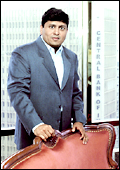 Manish
Kejriwal Manish
Kejriwal
37/Temasek Holdings Advisors India Pvt. Ltd
Billion Dollar Dealer
Try this for
pedigree: he graduated from Harvard Business School and went to
work for McKinsey & Company, arguably, the world's best-known
and most-respected consulting firm where he spent nearly a decade.
He is married to Sunaina, the daughter of Bajaj Auto Chairman
Rahul Bajaj. And he now heads the Indian arm of what is probably
Asia's most aggressive private equity player, the Singapore government-owned
Temasek. In two years, Kejriwal and Temasek have invested in companies
such as TCS, Apollo Hospitals, Matrix Laboratories, Gateway Distriparks,
Welspun India, Mahindra & Mahindra, ICICI, Reliance Capital,
Shringar Cinema, ICICI OneSource, and several others. By some
estimates, Temasek's investments in India, over the past two years
that the fund has been active in the country, exceed $1 billion
or Rs 4,500 crore. Along the way, Kejriwal, a regular swimmer
who is also into scuba diving and sailing, has earned the reputation
of being possessed of a golden touch. And despite the number of
deals closed by Temasek over the past two years-around 12-Kejriwal
wouldn't mind if Temasek were to do fewer deals in India, as long
as he and his predominantly young team can add some value to the
investee company. The media-shy Kejriwal (he is otherwise completely
into news, whether at his 11th floor office in Mumbai's business
hub Nariman Point or at home, where he watches either CNN or BBC)
works hard and keeps a punishing schedule, but takes time off
to spend with his wife and three-year-old son, read, or watch
the latest from Bollywood. The sectors on the man's radar right
now: banking, telecom, auto, it, BPO, pharmaceuticals, and export-based
businesses.
Anand Adhikari
Rajesh Khanna
40/Managing Director/Warburg Pincus India
Entrepreneurial Investor
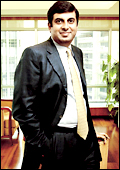 When,
in 1995, Rajesh Khanna signed on with private-equity major Warburg
Pincus, he did not really know what private equity was. "The
first two years were spent learning what private equity was and
what Warburg Pincus was about." Well, Khanna, a chartered
accountant who worked with Arthur Andersen for a couple of years
before going off to enrol at Indian Institute of Management, Ahmedabad
(he worked with Citibank for a while before switching to Warburg
Pincus), has learnt quickly. Today, Warburg has a clutch of investments
in the country, is among the most respected private equity players
around, and Khanna has had, and is having, a lot of fun. "For
me, the kick has been in investing in companies like Moser Baer,
Gujarat Ambuja, Max India, Nicholas Piramal, Kotak Mahindra Bank
and HDFC," he says, singling out Max India as the most complicated
deal he has closed (it required an approval from India's Foreign
Investment Promotion Board). "I believe strongly in India's
growth story," says Khanna. It shows: 10 per cent of Warburg
Pincus' assets are invested in India. For the record, the firm's
other Managing Director, Pulak Prasad, also features in this listing
(see page 118). When,
in 1995, Rajesh Khanna signed on with private-equity major Warburg
Pincus, he did not really know what private equity was. "The
first two years were spent learning what private equity was and
what Warburg Pincus was about." Well, Khanna, a chartered
accountant who worked with Arthur Andersen for a couple of years
before going off to enrol at Indian Institute of Management, Ahmedabad
(he worked with Citibank for a while before switching to Warburg
Pincus), has learnt quickly. Today, Warburg has a clutch of investments
in the country, is among the most respected private equity players
around, and Khanna has had, and is having, a lot of fun. "For
me, the kick has been in investing in companies like Moser Baer,
Gujarat Ambuja, Max India, Nicholas Piramal, Kotak Mahindra Bank
and HDFC," he says, singling out Max India as the most complicated
deal he has closed (it required an approval from India's Foreign
Investment Promotion Board). "I believe strongly in India's
growth story," says Khanna. It shows: 10 per cent of Warburg
Pincus' assets are invested in India. For the record, the firm's
other Managing Director, Pulak Prasad, also features in this listing
(see page 118).
-Krishna Gopalan
 Hemant
Mallik Hemant
Mallik
39/Head (Marketing)/ITC Foods
The Perfect Pitch
ITC found Hemant
Mallik and vice versa under a tree on the Joka campus of Indian
Institute of Management, Calcutta, during placement season in
1989. Placements weren't as organised as they are now, and several
senior execs from blue-chip companies found themselves waiting
for a room where they could interview people. The manager from
ITC, recalls Mallik, who cannot remember the man's name, just
led the group of people he was to interview to a shaded spot under
a tree, and started the process. "That ability to think on
his feet and solve problems rather than blame the system impressed
me," he says. It impressed him enough to sign on with ITC
and stay with it since, and enough to treat it as a tenet of sorts,
first while marketing cigarettes and recently, while helping the
company find its feet in the competitive consumer foods space.
Today, ITC's foods business boasts a turnover of over Rs 700 crore
(think brands such as Kitchens of India, Candyman and Sunfeast).
"The credit goes to the team," says a modest Mallik,
"I have just played my role."
-Venkatesha Babu
Rajiv Memani
38/Country Managing Partner and CEO/Ernst & Young India
The Competitive Conservative
 I
am a staid guy," declares Rajiv Memani, proffering his tastes
in music (Hindustani; Pandit Jasraj is a favourite), literature
(he is reading Amartya Sen's The Argumentative Indian) and leisure
activities (spending time with wife and son) as evidence. Well,
there is nothing staid about the company he heads, a large professional
services firm that, apart from being among the country's biggest
auditors, is also among its biggest corporate financial advisers
(in terms of deals closed, it is among the top three i-banks in
the country). Nor can the word be used to describe his stint as
CMP. His elevation to the top post, superseding several others,
was not really smooth; then, some senior partners who had signed
on from Arthur Andersen left, again in circumstances that were
not really pleasant. "That year, 2004, was one of the most
challenging in my life," says Memani. The Delhi boy (he went
to school at Delhi Public School, studied commerce at the city's
Shri Ram College of Commerce, and then qualified as a chartered
accountant), who believes only the paranoid survive has, er..,
survived, and thrived. I
am a staid guy," declares Rajiv Memani, proffering his tastes
in music (Hindustani; Pandit Jasraj is a favourite), literature
(he is reading Amartya Sen's The Argumentative Indian) and leisure
activities (spending time with wife and son) as evidence. Well,
there is nothing staid about the company he heads, a large professional
services firm that, apart from being among the country's biggest
auditors, is also among its biggest corporate financial advisers
(in terms of deals closed, it is among the top three i-banks in
the country). Nor can the word be used to describe his stint as
CMP. His elevation to the top post, superseding several others,
was not really smooth; then, some senior partners who had signed
on from Arthur Andersen left, again in circumstances that were
not really pleasant. "That year, 2004, was one of the most
challenging in my life," says Memani. The Delhi boy (he went
to school at Delhi Public School, studied commerce at the city's
Shri Ram College of Commerce, and then qualified as a chartered
accountant), who believes only the paranoid survive has, er..,
survived, and thrived.
-Ashish Gupta
 Arvind
Mendiratta Arvind
Mendiratta
38/Chief Marketing Officer/Yum Restaurants International
Master Marketer
Not too many
young achievers can claim, like Arvind Mendiratta justifiably
can, that they know what women want. Between 2003 and 2005, when
he was Head of Marketing at Whirlpool, he orchestrated a campaign
along the same theme that, he says, helped the company increase
its market share in the refrigerator and washing machine category
from 20 per cent to 25 per cent. "Durables is an extremely
competitive business and even a one percentage point increase
in share is a big achievement," says Mendiratta, an engineer
from Indian Institute of Technology, Delhi, who then took the
road more travelled to graduate from Indian Institute of Management,
Calcutta. Then came a long stint with P&G in India, Bangkok
and Singapore, the highlight of which was the India-launch of
detergent brand Ariel, two years at Marico, his first shot at
heading the marketing function of a company, and then Whirlpool.
"Retail is an emerging sector and Yum is a leading chain
trying to reposition its Pizza Hut and KFC brands in India,"
he says. "I thought it could be a challenging project to
work on."
-Archna Shukla
Prashant Panday
40/Deputy CEO/Radio Mirchi
The Man Who Can Sell Anything
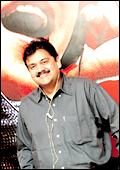 We
started from scratch six years ago, and today, we can claim to
be one of the largest media vehicles in the country with an audience
base of 13 million," says Prashant Panday. "Even The
Times of India can't boast this kind of consumer base." If
Bennett Coleman & Company Limited (BCCL), the publisher of
The Times of India, is unlikely to take offence at that statement,
it is because Panday works for it and is speaking of Radio Mirchi,
an fm station owned by its subsidiary, Entertainment Network India
Limited (the company recently made an IPO). "Prashant is
an excellent brand manager," says the company's CEO A.P.
Parigi. Panday's and Radio Mirchi's success can be attributed
to the former's approach to media-marketing: identify the target
audience, come up with a relevant marketing strategy, and then
think about the content. If that sounds like a marketing-heavy
approach, it is because Panday, an engineer who graduated from
Indian Institute of Management, Bangalore, believes "all
you need to do is get your marketing formula right". Well,
he's done that at Citibank, Pepsi, HLL, and now Radio Mirchi. We
started from scratch six years ago, and today, we can claim to
be one of the largest media vehicles in the country with an audience
base of 13 million," says Prashant Panday. "Even The
Times of India can't boast this kind of consumer base." If
Bennett Coleman & Company Limited (BCCL), the publisher of
The Times of India, is unlikely to take offence at that statement,
it is because Panday works for it and is speaking of Radio Mirchi,
an fm station owned by its subsidiary, Entertainment Network India
Limited (the company recently made an IPO). "Prashant is
an excellent brand manager," says the company's CEO A.P.
Parigi. Panday's and Radio Mirchi's success can be attributed
to the former's approach to media-marketing: identify the target
audience, come up with a relevant marketing strategy, and then
think about the content. If that sounds like a marketing-heavy
approach, it is because Panday, an engineer who graduated from
Indian Institute of Management, Bangalore, believes "all
you need to do is get your marketing formula right". Well,
he's done that at Citibank, Pepsi, HLL, and now Radio Mirchi.
-Archna Shukla
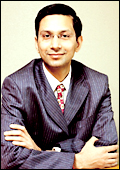 Pulak
Prasad Pulak
Prasad
38/Managing Director/Warburg Pincus India
The Bharti Man
It would have
been a crime to headline this any other way. Pulak Prasad is the
man who took the call, in 1999, to invest in Bharti Tele-Ventures
(between September 1999 and July 2001, Warburg invested $292 million
in Bharti). In 2005, the company sold its last shares in the telco;
all told, it made a profit of about $1.3 billion (Rs 5,850 crore).
Prasad downplays his role in the deal, saying only that it began
with a cold call to Akhil Gupta, Bharti's CFO, and he is quick
to add that "the key reason for its (Bharti's) success is
Sunil (Mittal) and his team", but Warburg Pincus' role in
Bharti, in terms of helping the company evolve the appropriate
strategy, and adhere to the highest standards of corporate governance,
cannot be discounted. Prasad, a product of Indian Institute of
Technology, Delhi, and Indian Institute of Management, Ahmedabad,
entered the world of private equity by chance-he was a consultant
at McKinsey when he received a call from a headhunter-but he likes
what he is doing. "Over the next 10-15 years, I see myself
doing nothing but this," he says. "It's my passion."
-Krishna Gopalan
Subhinder Singh Prem
37/Managing Director/Reebok India
Boot-strap Operator
 Subhinder
is one shoe-maker who has made big promises and kept them all,"
says Vishnu Bhagat, CFO, Reebok India, referring to the adage
(popular in this country) about promise-breakers being shoe-makers.
That may just be a peer's approval-Bhagat and Subhinder Singh
Prem signed up with Reebok around the same time, in 1995 -or it
could be a numbers-man admiration for, er.., numbers. Between
2003, when Prem took over, and now, Reebok India has grown its
business 150 per cent from Rs 160 crore to Rs 400 crore. Prem
himself, a graduate of Delhi's Shri Ram College of Commerce, who
then headed off to imt, Ghaziabad, for an MBA, credits the growth
to his team. The man believes he was destined to be in the shoe
business: he started off with Ranbaxy, but moved quickly to Mescos
(it had a shoe business in the early 1990s), then Reebok, where
he started off as Footwear Manager. In 2004 and 2005, Reebok India
was named the best subsidiary within the Reebok system, "a
major achievement," according to Prem. "There are many
emerging markets we compete with." Subhinder
is one shoe-maker who has made big promises and kept them all,"
says Vishnu Bhagat, CFO, Reebok India, referring to the adage
(popular in this country) about promise-breakers being shoe-makers.
That may just be a peer's approval-Bhagat and Subhinder Singh
Prem signed up with Reebok around the same time, in 1995 -or it
could be a numbers-man admiration for, er.., numbers. Between
2003, when Prem took over, and now, Reebok India has grown its
business 150 per cent from Rs 160 crore to Rs 400 crore. Prem
himself, a graduate of Delhi's Shri Ram College of Commerce, who
then headed off to imt, Ghaziabad, for an MBA, credits the growth
to his team. The man believes he was destined to be in the shoe
business: he started off with Ranbaxy, but moved quickly to Mescos
(it had a shoe business in the early 1990s), then Reebok, where
he started off as Footwear Manager. In 2004 and 2005, Reebok India
was named the best subsidiary within the Reebok system, "a
major achievement," according to Prem. "There are many
emerging markets we compete with."
-Archna Shukla
 Rajiv
Sabharwal Rajiv
Sabharwal
40/General Manager and Head (Mortgages and Real Estate)/ ICICI
Bank
Home Depot Personified
Not too long
ago, HDFC was the market leader in the retail mortgages market.
ICICI Bank was not on the horizon. Today, ICICI Bank is the market
leader with a 32 per cent market share. Rajiv Sabharwal can take
some of the credit for that. When, in what was then ICICI, he
moved to the mortgages department in 2001, disbursements were
a mere Rs 100 crore a month. Today, the corresponding number is
Rs 2,500 crore. "The market is large out there," says
Sabharwal, "and there is a huge demand waiting to be met."
In some ways, the man has the right background for the job of
reaching out to people across the country (ICICI is famous for
the reach of its retail mortgages products). His first job, after
he graduated from Indian Institute of Management, Lucknow, was
with Godrej GE which sent him to Haryana to sell refrigerators.
Sabharwal has developed strong relationships with developers and
launched new products but, in a country where a home is still
one of those once-in-a-lifetime purchase, the man will be remembered
for funding dreams.
-Anand Adhikari
Dan Sandhu
37/CEO/Vertex India
BPO-boomer
 In
some ways, the story of Dan Sandhu is that of a typical new-age
Indian. Sandhu is UK-born, qualified as a chartered accountant,
and while at Leeds Business School, promoted a rock band and launched
a radio station afterwards. He worked for a media firm for some
time, but then met the founders of a business process outsourcing
firm, 7c, in 1998. He joined as the Head of Finance, moved to
start up the Indian operations with just over 50-employees, and
in December 2002, when the company was acquired by Vertex, he
was asked to stay on as head of Vertex India. Today, Vertex India
has over 2,200 people on its rolls and thanks to Sandhu's innovative
hr practices-signing up entire families in the workforce, being
driven to work occasionally in the CEO's Mercedes, being served
lunch by a senior manager-retention is among the highest in the
industry. "People stay in work because of people," says
Sandhu, who is also emerging as a face of the BPO industry because
of his involvement with NASSCOM. "It is more or less the
same work and money elsewhere." In
some ways, the story of Dan Sandhu is that of a typical new-age
Indian. Sandhu is UK-born, qualified as a chartered accountant,
and while at Leeds Business School, promoted a rock band and launched
a radio station afterwards. He worked for a media firm for some
time, but then met the founders of a business process outsourcing
firm, 7c, in 1998. He joined as the Head of Finance, moved to
start up the Indian operations with just over 50-employees, and
in December 2002, when the company was acquired by Vertex, he
was asked to stay on as head of Vertex India. Today, Vertex India
has over 2,200 people on its rolls and thanks to Sandhu's innovative
hr practices-signing up entire families in the workforce, being
driven to work occasionally in the CEO's Mercedes, being served
lunch by a senior manager-retention is among the highest in the
industry. "People stay in work because of people," says
Sandhu, who is also emerging as a face of the BPO industry because
of his involvement with NASSCOM. "It is more or less the
same work and money elsewhere."
-Shaleen Agrawal
 Deepak
Sogani Deepak
Sogani
39/CFO/Patni Computer Systems
Enjoying The Ride
He was the first
professional in the finance function at Patni. Eight years ago,
when Deepak Sogani signed on- he was advising Patni then in his
capacity as an independent consultant-his mandate was clear: transform
Patni from a diversified family-held business to a widely-owned,
pure-play it services one. And the IIT-Delhi, IIM-A (1991) alumnus
has been turning it on ever since. His first task was to de-merge
the non-core businesses like hardware, after which foreign investors
began sniffing around for a stake. First came GE, investing roughly
$15 million; then, in 2002, General Atlantic Partners pumped all
of $100 million (Rs 490 crore then) into the company, making it
the largest private equity deal in the world in that year. "The
gap deal was challenging," says the former investment banker,
explaining that the needs of the family and other stakeholders
had to be balanced. In 2004, the company made an IPO; the same
year, it acquired Cymbal, a California-based, telecom-focussed
it services player for $68 million (Rs 306 crore then); and last
December, it listed on the New York Stock Exchange. "We still
have some more distance to travel," says Sogani, who has
seen Patni grow from a $30 million company to a $450 million or
Rs 2,025 crore (as of December 2005) one.
-Brian Carvalho
Aashish Sonawala
37/Director (Sales)/GE Capital Aviation Services
High-flier
 When
GECAS discovered Aashish Sonawala was part of this list, the person
most excited was not the man himself, but his boss, Bill Blair.
That can only be an indication of how good a job Sonawala has
done. In the past year alone, GECAS, the world's second largest
aircraft lessor after ILFC, has placed aircraft worth over $2.5
billion (Rs 11,250 crore) in the Indian market, the world's second
hottest after China. Sonawala, who has been a GE-lifer (he signed
on after he finished his MBA from Boston University), attributes
part of the company's success to GE's historical presence in the
Indian aviation market (through GE Aircraft Engines) and part
of his individual achievements to the company's culture. "This
is a truly global company; this is not an American company operating
across the world," he says. With the Indian aviation sector
expected to grow at between 20-25 per cent over the next few years,
Sonawala expects to be fairly busy over the next few years as
well, "If the Finance Minister wants 8-10 per cent growth,
aviation will have to play a key role, and so will we." When
GECAS discovered Aashish Sonawala was part of this list, the person
most excited was not the man himself, but his boss, Bill Blair.
That can only be an indication of how good a job Sonawala has
done. In the past year alone, GECAS, the world's second largest
aircraft lessor after ILFC, has placed aircraft worth over $2.5
billion (Rs 11,250 crore) in the Indian market, the world's second
hottest after China. Sonawala, who has been a GE-lifer (he signed
on after he finished his MBA from Boston University), attributes
part of the company's success to GE's historical presence in the
Indian aviation market (through GE Aircraft Engines) and part
of his individual achievements to the company's culture. "This
is a truly global company; this is not an American company operating
across the world," he says. With the Indian aviation sector
expected to grow at between 20-25 per cent over the next few years,
Sonawala expects to be fairly busy over the next few years as
well, "If the Finance Minister wants 8-10 per cent growth,
aviation will have to play a key role, and so will we."
-Kushan Mitra
 Pankaj
Srivastava Pankaj
Srivastava
36/CFO/Kodak India
Numbers Of Note
That finance
pros have a role, a significant one, to play in the success of
marketing-heavy consumer products companies is borne out by the
success of Pankaj Srivasatava, an engineer from Delhi College
of Engineering and alumnus of Indian Institute of Management,
Bangalore. Since he signed on with Kodak in 2001 as the Head of
Finance of the consumer imaging business, Srivastava has re-engineered
the company's supply chain and inventory management systems, just
the kind of thing that makes CEOs happy. "He keeps a business
perspective in mind while taking financial decisions," says
Ravi Karamcheti, Managing Director, Kodak. Not surprisingly, Srivasatava,
named Chief Financial Officer this year, admits that "the
opportunities given to me by this company have been tremendous".
-Ahona Ghosh
Rahul Verma
34/Senior Director (India HR)/Accenture
People Person
 There
are few people in the IT services space that can claim to have
worked for the same company. There are fewer still who can claim
to have been made Head of hr at 27. Rahul Verma can, on both counts.
In 2001, when Accenture (then known as Andersen Consulting) decided
that it was time to scale up its operations in India, and pay
some obeisance to that 'offshoring' trend that had created several
of its Indian rivals, it had a workforce of just around 200 in
the country. Today, it employs 16,800; Verma, a graduate in economics
from Delhi University who went to Pune's Symbiosis to specialise
in personnel management, has overseen that growth. The son of
academics (his parents are both Ph.Ds and met while studying in
what was then the USSR), Verma could have been expected to become
an engineer or a doctor. The man himself had other plans; he had
always considered himself a people's person. "HR is not a
staff function, but a line one," he says, something that
is particularly true of the IT services business. Part of Verma's
success can be attributed to his philosophy of trying to solve
any problem from first principles (as opposed to just accepting
conventional wisdom). For instance, when Accenture felt the need
to hire more people, Verma's approach suggested that it first
hire hr pros, who could then help the company scale up its operations.
Rather than hire mid- and senior-level hr execs from other firms,
Accenture hires young people on the basis of a screening test
and their aptitude for hr, and then puts them through a customised
Accenture-XLRI two-year weekend course (Accenture pays for part
of it) even as they learn on the job during the week. "Create,
don't borrow or steal," says Verma, who was rejected twice
by XLRI when he was trying to specialise in hr. "All of us
appreciate the insight and the strategic view Rahul brings to
the table," adds Chet Kamath, Managing Partner, Accenture
India. There
are few people in the IT services space that can claim to have
worked for the same company. There are fewer still who can claim
to have been made Head of hr at 27. Rahul Verma can, on both counts.
In 2001, when Accenture (then known as Andersen Consulting) decided
that it was time to scale up its operations in India, and pay
some obeisance to that 'offshoring' trend that had created several
of its Indian rivals, it had a workforce of just around 200 in
the country. Today, it employs 16,800; Verma, a graduate in economics
from Delhi University who went to Pune's Symbiosis to specialise
in personnel management, has overseen that growth. The son of
academics (his parents are both Ph.Ds and met while studying in
what was then the USSR), Verma could have been expected to become
an engineer or a doctor. The man himself had other plans; he had
always considered himself a people's person. "HR is not a
staff function, but a line one," he says, something that
is particularly true of the IT services business. Part of Verma's
success can be attributed to his philosophy of trying to solve
any problem from first principles (as opposed to just accepting
conventional wisdom). For instance, when Accenture felt the need
to hire more people, Verma's approach suggested that it first
hire hr pros, who could then help the company scale up its operations.
Rather than hire mid- and senior-level hr execs from other firms,
Accenture hires young people on the basis of a screening test
and their aptitude for hr, and then puts them through a customised
Accenture-XLRI two-year weekend course (Accenture pays for part
of it) even as they learn on the job during the week. "Create,
don't borrow or steal," says Verma, who was rejected twice
by XLRI when he was trying to specialise in hr. "All of us
appreciate the insight and the strategic view Rahul brings to
the table," adds Chet Kamath, Managing Partner, Accenture
India.
-Venkatesha Babu
 Ireena
Vittal Ireena
Vittal
37/Partner, McKinsey & Company
Conscious Consultant
Humour of the
self-deprecating kind is a welcome trait in a man or a woman.
It is doubly welcome in a successful woman who works for the world's
best-known consulting firm, McKinsey & Company. "Business,"
says Ireena Vittal, who calls McKinsey a terrific university where
one works for the best clients and hires the best people, "is
simple; we complicate it." Well, since 1996, when she signed
on with the firm, she has been 'complicating it' in sectors such
as retail, consumer goods and energy, and 'complicating' it successfully
at that. No one in India, she claims, has a successful model (for
retailing) because "the consumer is always ahead of you".
"No one has a format that will work," she adds. The
job, despite having spent 10 years on it, is still fun, says Vittal,
because she is "still learning". Even her stints with
Nestle (her first job) and Max (she helped launch Max's mobile
telephony service in Mumbai), she claims, were good learning experiences.
"At Max, we had about 90 days to launch the brand in Mumbai
and we knew nothing about the category," she recalls. The
lady, who travels for around 12 days a month (made bearable by
the fact that husband Gopal, too, travels a lot), still manages
to catch up with her reading (no management books for her please;
"they're boring") and believes that this is a good time
to be in India. "To me, the present is important," she
says. "I think we in India are lucky to be alive at a stage
considering the amount of action that is taking place."
-Krishna Gopalan
Gopal Vittal
39/Regional Category Vice President, Asia, (Fabric Cleaning)/HLL
Uber-salesman
 For
16 years now, ever since he graduated from Indian Institute of
Management, Calcutta, in 1990, Gopal Vittal has worked for the
same company, Hindustan Lever Limited. Ask him about that and
he will quickly clarify that his association with the company
dates further back; after his graduation from Madras Christian
College, he worked with Brooke Bond (which merged with HLL in
1996) for a brief while (saving enough money for a vacation to
the North East of the country, that he still recollects fondly)
before moving on to IIM-C. Today, he travels for 16-17 days a
month (work-life balance maintained by the fact that his wife,
Ireena, is also a fast-tracker at a consulting firm) and has a
region-wide responsibility that he is thrilled with. "The
kick comes from dealing with different cultures, like in Thailand
and Philippines," he says. Vittal recollects the relaunch
of Lifebuoy, between 2001 and 2003, fondly. "The period was
a turnaround for the brand," he says. "Since then, its
turnover has doubled." And his responsibilities, many times
over. For
16 years now, ever since he graduated from Indian Institute of
Management, Calcutta, in 1990, Gopal Vittal has worked for the
same company, Hindustan Lever Limited. Ask him about that and
he will quickly clarify that his association with the company
dates further back; after his graduation from Madras Christian
College, he worked with Brooke Bond (which merged with HLL in
1996) for a brief while (saving enough money for a vacation to
the North East of the country, that he still recollects fondly)
before moving on to IIM-C. Today, he travels for 16-17 days a
month (work-life balance maintained by the fact that his wife,
Ireena, is also a fast-tracker at a consulting firm) and has a
region-wide responsibility that he is thrilled with. "The
kick comes from dealing with different cultures, like in Thailand
and Philippines," he says. Vittal recollects the relaunch
of Lifebuoy, between 2001 and 2003, fondly. "The period was
a turnaround for the brand," he says. "Since then, its
turnover has doubled." And his responsibilities, many times
over.
-Krishna Gopalan
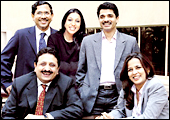 |
| Bringing it all together: (Seated left-right)
Transearch's Atul Vohra and Accord's Sonal Agrawal; (standing
left-right) Ma Foi's K. Pandia Rajan, Shilputsi's Purvi Sheth
and Stanton Chase's Venkat Shastry |
METHODOLOGY
How We Did It
How did business
today identify the 25 hottest Young Executives in the country?
As a first step, we solicited the participation of the country's
largest and best-known executive search firms. Five of the firms
(the same five that had participated in the last edition of the
survey)-Accord, Shilputsi, Ma Foi, Stanton Chase and Transearch-agreed
to participate in the exercise. Each was asked to create a list
of executives who were 40 or under, who had consistently been
on the fast-track in their respective firms, and who had done
something of note in the past 18 months. The firms were asked
to exclude those individuals that had already appeared in earlier
editions of the study. A team of Business Today editors created
a shortlist of around 100 from the individual listings sent across
by the search firms. In late February, senior editors of the magazine
and the heads or senior partners of the search firms met in Mumbai
to discuss the entries in the shortlist. The criteria: an age
of 40 or lower, currently employed (not between jobs), a consistent
track record, and a significant achievement in the past 18 months.
Other factors considered included the size and the complexity
of the business their companies were in, and their impact on their
companies and industry as a whole. While due care was taken to
ensure enough representation for all sectors, no quotas were set.
The result: the third listing of BT's Hottest Young Executives
in India.
|




 What
sort of man would love to be called that? A man who has stood
on the store-floor and, by his own admission, "sold 52 shirts
in a single day". A man who spent nights on the site while,
in his previous job, involved in the creation of the first Globus
store. A man whose two children love to spend time at the stores
their father oversees, thereby, providing him with an easy option
to balance life and work. And a man who is feted by his boss,
the notoriously hard-to-please Kishore Biyani, India's most successful
retailer for his eye for "detail" and "meticulousness".
The man is Ved Prakash Arya, a graduate of Indian Institute of
Management, Ahmedabad, who believes he is where he is (he comes
from a middle-class family in Jaipur) because "people trusted
me at a young age". Well, he has proved himself: in the past
18 months he has closed two venture capital funds focussed on
the retail space, a new business for the company; he is responsible
for all of Pantaloon's M&A activities; and he also oversees
all its strategic initiatives.
What
sort of man would love to be called that? A man who has stood
on the store-floor and, by his own admission, "sold 52 shirts
in a single day". A man who spent nights on the site while,
in his previous job, involved in the creation of the first Globus
store. A man whose two children love to spend time at the stores
their father oversees, thereby, providing him with an easy option
to balance life and work. And a man who is feted by his boss,
the notoriously hard-to-please Kishore Biyani, India's most successful
retailer for his eye for "detail" and "meticulousness".
The man is Ved Prakash Arya, a graduate of Indian Institute of
Management, Ahmedabad, who believes he is where he is (he comes
from a middle-class family in Jaipur) because "people trusted
me at a young age". Well, he has proved himself: in the past
18 months he has closed two venture capital funds focussed on
the retail space, a new business for the company; he is responsible
for all of Pantaloon's M&A activities; and he also oversees
all its strategic initiatives.

 Koushik
Chatterjee
Koushik
Chatterjee While
in his teens, Francisco D'Souza taught himself programming to
make some money on the side as a contract coder. At 24, he was
already a co-founder of Cognizant Technology Solutions, an American
it services company that was created to leverage the India advantage.
Today, he is Chief Operating Officer of the same company and his
CEO, Lakshmi Narayan, says, "Francisco has built the front-end
(client-facing) organisation of Cognizant, which clearly differentiates
us from other offshore players." In an industry where the
ability to manage cultural diversity is becoming increasingly
crucial, D'Souza himself is a bit of a cultural chameleon. He
was born in Nairobi and has studied all over the world, fallout
of his father's job; the man was with the Indian Foreign Service
and believed that his son would be better off studying at local
schools rather than the international ones that diplomats prefer.
Armed with an MBA from Carnegie Mellon, D'Souza signed up with
Dun & Bradstreet; then, helped build Cognizant. "I am
just part of the cultural system that nourishes talent,"
he says modestly.
While
in his teens, Francisco D'Souza taught himself programming to
make some money on the side as a contract coder. At 24, he was
already a co-founder of Cognizant Technology Solutions, an American
it services company that was created to leverage the India advantage.
Today, he is Chief Operating Officer of the same company and his
CEO, Lakshmi Narayan, says, "Francisco has built the front-end
(client-facing) organisation of Cognizant, which clearly differentiates
us from other offshore players." In an industry where the
ability to manage cultural diversity is becoming increasingly
crucial, D'Souza himself is a bit of a cultural chameleon. He
was born in Nairobi and has studied all over the world, fallout
of his father's job; the man was with the Indian Foreign Service
and believed that his son would be better off studying at local
schools rather than the international ones that diplomats prefer.
Armed with an MBA from Carnegie Mellon, D'Souza signed up with
Dun & Bradstreet; then, helped build Cognizant. "I am
just part of the cultural system that nourishes talent,"
he says modestly. Vinod
Dasari
Vinod
Dasari He
dreamt of working for the Tata Group, and did work for Tata Motors
for two years after qualifying as an engineer. Then, he left to
acquire a postgraduate diploma in management from Indian Institute
of Management, Bangalore, because he got bored. "I want a
job that will charge you up to come back the next day," says
Bhargav Dasgupta. His present job at ICICI Bank, an organisation
he has been with (it was ICICI, actually) since 1992, should do
that. Dasgupta is the man in charge of expanding the bank's international
footprint. At the end of 2005, ICICI Bank's international business
(some $7 billion or Rs 31,500 crore) accounted for 15 per cent
of its total business; by 2008, this proportion, says Dasgupta,
will be 25 per cent. "Initially, we followed our customers
and tried to be the bank for non-resident Indians," says
the man, who travels 15 days a month, "but in the past year-and-a-half,
we have targeted the non-Indian community and in Canada and the
UK, 70 per cent of our new customers are not Indians."
He
dreamt of working for the Tata Group, and did work for Tata Motors
for two years after qualifying as an engineer. Then, he left to
acquire a postgraduate diploma in management from Indian Institute
of Management, Bangalore, because he got bored. "I want a
job that will charge you up to come back the next day," says
Bhargav Dasgupta. His present job at ICICI Bank, an organisation
he has been with (it was ICICI, actually) since 1992, should do
that. Dasgupta is the man in charge of expanding the bank's international
footprint. At the end of 2005, ICICI Bank's international business
(some $7 billion or Rs 31,500 crore) accounted for 15 per cent
of its total business; by 2008, this proportion, says Dasgupta,
will be 25 per cent. "Initially, we followed our customers
and tried to be the bank for non-resident Indians," says
the man, who travels 15 days a month, "but in the past year-and-a-half,
we have targeted the non-Indian community and in Canada and the
UK, 70 per cent of our new customers are not Indians." Kamesh
Goyal
Kamesh
Goyal He
should have ended up as a chartered accountant, but the self-confessed
urge to do something "different and exciting" saw Tarun
Katial jump into the world of advertising where he spent a fruitful
three years with agencies such as Saatchi & Saatchi, Enterprise
Nexus, and Ogilvy & Mather. "I enjoyed my work, but wasn't
too happy," says Katial, implying that his itch wasn't satisfied.
Then, television happened. Spotted by Sameer Nair, the Chief Operating
Officer of star TV, Katial spent five years with the company,
but these were the years when the flagship channel of the network,
star Plus, became India's most successful entertainment channel
(it remains that today with over 40 of the top 50 shows in terms
of rating points). Katial was very much involved with the launch
of Kaun Banega Crorepati, the game show that changed the face
of Indian television and a clutch of Balaji Telefilms weepies.
"My perception was that for any product to cut ice with Indian
viewers, it would have to be rooted in Indian values," remembers
Katial. In 2000, star, impressed by the young man, promoted him
to its Asia team, but Katial didn't want to move to Hong Kong;
instead, he chose to move to rival Sony Entertainment Television.
"Our entire team tried to stop him as he was an asset to
us, but he had made up his mind," says Peter Mukerjea, CEO,
Star TV. Katial worked his magic at Sony as well with soaps such
as Jassi Jaisi Kohi Nahin and a talent show, Indian Idol, modelled
on American Idol. Then came an offer from the Anil Dhirubhai Ambani
Group (through Adlabs) to head its fm operations (it acquired
44 licences recently) and Katial, who feels "this stint could
be extremely challenging", jumped at the opportunity.
He
should have ended up as a chartered accountant, but the self-confessed
urge to do something "different and exciting" saw Tarun
Katial jump into the world of advertising where he spent a fruitful
three years with agencies such as Saatchi & Saatchi, Enterprise
Nexus, and Ogilvy & Mather. "I enjoyed my work, but wasn't
too happy," says Katial, implying that his itch wasn't satisfied.
Then, television happened. Spotted by Sameer Nair, the Chief Operating
Officer of star TV, Katial spent five years with the company,
but these were the years when the flagship channel of the network,
star Plus, became India's most successful entertainment channel
(it remains that today with over 40 of the top 50 shows in terms
of rating points). Katial was very much involved with the launch
of Kaun Banega Crorepati, the game show that changed the face
of Indian television and a clutch of Balaji Telefilms weepies.
"My perception was that for any product to cut ice with Indian
viewers, it would have to be rooted in Indian values," remembers
Katial. In 2000, star, impressed by the young man, promoted him
to its Asia team, but Katial didn't want to move to Hong Kong;
instead, he chose to move to rival Sony Entertainment Television.
"Our entire team tried to stop him as he was an asset to
us, but he had made up his mind," says Peter Mukerjea, CEO,
Star TV. Katial worked his magic at Sony as well with soaps such
as Jassi Jaisi Kohi Nahin and a talent show, Indian Idol, modelled
on American Idol. Then came an offer from the Anil Dhirubhai Ambani
Group (through Adlabs) to head its fm operations (it acquired
44 licences recently) and Katial, who feels "this stint could
be extremely challenging", jumped at the opportunity. Manish
Kejriwal
Manish
Kejriwal When,
in 1995, Rajesh Khanna signed on with private-equity major Warburg
Pincus, he did not really know what private equity was. "The
first two years were spent learning what private equity was and
what Warburg Pincus was about." Well, Khanna, a chartered
accountant who worked with Arthur Andersen for a couple of years
before going off to enrol at Indian Institute of Management, Ahmedabad
(he worked with Citibank for a while before switching to Warburg
Pincus), has learnt quickly. Today, Warburg has a clutch of investments
in the country, is among the most respected private equity players
around, and Khanna has had, and is having, a lot of fun. "For
me, the kick has been in investing in companies like Moser Baer,
Gujarat Ambuja, Max India, Nicholas Piramal, Kotak Mahindra Bank
and HDFC," he says, singling out Max India as the most complicated
deal he has closed (it required an approval from India's Foreign
Investment Promotion Board). "I believe strongly in India's
growth story," says Khanna. It shows: 10 per cent of Warburg
Pincus' assets are invested in India. For the record, the firm's
other Managing Director, Pulak Prasad, also features in this listing
(see page 118).
When,
in 1995, Rajesh Khanna signed on with private-equity major Warburg
Pincus, he did not really know what private equity was. "The
first two years were spent learning what private equity was and
what Warburg Pincus was about." Well, Khanna, a chartered
accountant who worked with Arthur Andersen for a couple of years
before going off to enrol at Indian Institute of Management, Ahmedabad
(he worked with Citibank for a while before switching to Warburg
Pincus), has learnt quickly. Today, Warburg has a clutch of investments
in the country, is among the most respected private equity players
around, and Khanna has had, and is having, a lot of fun. "For
me, the kick has been in investing in companies like Moser Baer,
Gujarat Ambuja, Max India, Nicholas Piramal, Kotak Mahindra Bank
and HDFC," he says, singling out Max India as the most complicated
deal he has closed (it required an approval from India's Foreign
Investment Promotion Board). "I believe strongly in India's
growth story," says Khanna. It shows: 10 per cent of Warburg
Pincus' assets are invested in India. For the record, the firm's
other Managing Director, Pulak Prasad, also features in this listing
(see page 118). Hemant
Mallik
Hemant
Mallik I
am a staid guy," declares Rajiv Memani, proffering his tastes
in music (Hindustani; Pandit Jasraj is a favourite), literature
(he is reading Amartya Sen's The Argumentative Indian) and leisure
activities (spending time with wife and son) as evidence. Well,
there is nothing staid about the company he heads, a large professional
services firm that, apart from being among the country's biggest
auditors, is also among its biggest corporate financial advisers
(in terms of deals closed, it is among the top three i-banks in
the country). Nor can the word be used to describe his stint as
CMP. His elevation to the top post, superseding several others,
was not really smooth; then, some senior partners who had signed
on from Arthur Andersen left, again in circumstances that were
not really pleasant. "That year, 2004, was one of the most
challenging in my life," says Memani. The Delhi boy (he went
to school at Delhi Public School, studied commerce at the city's
Shri Ram College of Commerce, and then qualified as a chartered
accountant), who believes only the paranoid survive has, er..,
survived, and thrived.
I
am a staid guy," declares Rajiv Memani, proffering his tastes
in music (Hindustani; Pandit Jasraj is a favourite), literature
(he is reading Amartya Sen's The Argumentative Indian) and leisure
activities (spending time with wife and son) as evidence. Well,
there is nothing staid about the company he heads, a large professional
services firm that, apart from being among the country's biggest
auditors, is also among its biggest corporate financial advisers
(in terms of deals closed, it is among the top three i-banks in
the country). Nor can the word be used to describe his stint as
CMP. His elevation to the top post, superseding several others,
was not really smooth; then, some senior partners who had signed
on from Arthur Andersen left, again in circumstances that were
not really pleasant. "That year, 2004, was one of the most
challenging in my life," says Memani. The Delhi boy (he went
to school at Delhi Public School, studied commerce at the city's
Shri Ram College of Commerce, and then qualified as a chartered
accountant), who believes only the paranoid survive has, er..,
survived, and thrived. Arvind
Mendiratta
Arvind
Mendiratta We
started from scratch six years ago, and today, we can claim to
be one of the largest media vehicles in the country with an audience
base of 13 million," says Prashant Panday. "Even The
Times of India can't boast this kind of consumer base." If
Bennett Coleman & Company Limited (BCCL), the publisher of
The Times of India, is unlikely to take offence at that statement,
it is because Panday works for it and is speaking of Radio Mirchi,
an fm station owned by its subsidiary, Entertainment Network India
Limited (the company recently made an IPO). "Prashant is
an excellent brand manager," says the company's CEO A.P.
Parigi. Panday's and Radio Mirchi's success can be attributed
to the former's approach to media-marketing: identify the target
audience, come up with a relevant marketing strategy, and then
think about the content. If that sounds like a marketing-heavy
approach, it is because Panday, an engineer who graduated from
Indian Institute of Management, Bangalore, believes "all
you need to do is get your marketing formula right". Well,
he's done that at Citibank, Pepsi, HLL, and now Radio Mirchi.
We
started from scratch six years ago, and today, we can claim to
be one of the largest media vehicles in the country with an audience
base of 13 million," says Prashant Panday. "Even The
Times of India can't boast this kind of consumer base." If
Bennett Coleman & Company Limited (BCCL), the publisher of
The Times of India, is unlikely to take offence at that statement,
it is because Panday works for it and is speaking of Radio Mirchi,
an fm station owned by its subsidiary, Entertainment Network India
Limited (the company recently made an IPO). "Prashant is
an excellent brand manager," says the company's CEO A.P.
Parigi. Panday's and Radio Mirchi's success can be attributed
to the former's approach to media-marketing: identify the target
audience, come up with a relevant marketing strategy, and then
think about the content. If that sounds like a marketing-heavy
approach, it is because Panday, an engineer who graduated from
Indian Institute of Management, Bangalore, believes "all
you need to do is get your marketing formula right". Well,
he's done that at Citibank, Pepsi, HLL, and now Radio Mirchi. Pulak
Prasad
Pulak
Prasad Subhinder
is one shoe-maker who has made big promises and kept them all,"
says Vishnu Bhagat, CFO, Reebok India, referring to the adage
(popular in this country) about promise-breakers being shoe-makers.
That may just be a peer's approval-Bhagat and Subhinder Singh
Prem signed up with Reebok around the same time, in 1995 -or it
could be a numbers-man admiration for, er.., numbers. Between
2003, when Prem took over, and now, Reebok India has grown its
business 150 per cent from Rs 160 crore to Rs 400 crore. Prem
himself, a graduate of Delhi's Shri Ram College of Commerce, who
then headed off to imt, Ghaziabad, for an MBA, credits the growth
to his team. The man believes he was destined to be in the shoe
business: he started off with Ranbaxy, but moved quickly to Mescos
(it had a shoe business in the early 1990s), then Reebok, where
he started off as Footwear Manager. In 2004 and 2005, Reebok India
was named the best subsidiary within the Reebok system, "a
major achievement," according to Prem. "There are many
emerging markets we compete with."
Subhinder
is one shoe-maker who has made big promises and kept them all,"
says Vishnu Bhagat, CFO, Reebok India, referring to the adage
(popular in this country) about promise-breakers being shoe-makers.
That may just be a peer's approval-Bhagat and Subhinder Singh
Prem signed up with Reebok around the same time, in 1995 -or it
could be a numbers-man admiration for, er.., numbers. Between
2003, when Prem took over, and now, Reebok India has grown its
business 150 per cent from Rs 160 crore to Rs 400 crore. Prem
himself, a graduate of Delhi's Shri Ram College of Commerce, who
then headed off to imt, Ghaziabad, for an MBA, credits the growth
to his team. The man believes he was destined to be in the shoe
business: he started off with Ranbaxy, but moved quickly to Mescos
(it had a shoe business in the early 1990s), then Reebok, where
he started off as Footwear Manager. In 2004 and 2005, Reebok India
was named the best subsidiary within the Reebok system, "a
major achievement," according to Prem. "There are many
emerging markets we compete with." Rajiv
Sabharwal
Rajiv
Sabharwal In
some ways, the story of Dan Sandhu is that of a typical new-age
Indian. Sandhu is UK-born, qualified as a chartered accountant,
and while at Leeds Business School, promoted a rock band and launched
a radio station afterwards. He worked for a media firm for some
time, but then met the founders of a business process outsourcing
firm, 7c, in 1998. He joined as the Head of Finance, moved to
start up the Indian operations with just over 50-employees, and
in December 2002, when the company was acquired by Vertex, he
was asked to stay on as head of Vertex India. Today, Vertex India
has over 2,200 people on its rolls and thanks to Sandhu's innovative
hr practices-signing up entire families in the workforce, being
driven to work occasionally in the CEO's Mercedes, being served
lunch by a senior manager-retention is among the highest in the
industry. "People stay in work because of people," says
Sandhu, who is also emerging as a face of the BPO industry because
of his involvement with NASSCOM. "It is more or less the
same work and money elsewhere."
In
some ways, the story of Dan Sandhu is that of a typical new-age
Indian. Sandhu is UK-born, qualified as a chartered accountant,
and while at Leeds Business School, promoted a rock band and launched
a radio station afterwards. He worked for a media firm for some
time, but then met the founders of a business process outsourcing
firm, 7c, in 1998. He joined as the Head of Finance, moved to
start up the Indian operations with just over 50-employees, and
in December 2002, when the company was acquired by Vertex, he
was asked to stay on as head of Vertex India. Today, Vertex India
has over 2,200 people on its rolls and thanks to Sandhu's innovative
hr practices-signing up entire families in the workforce, being
driven to work occasionally in the CEO's Mercedes, being served
lunch by a senior manager-retention is among the highest in the
industry. "People stay in work because of people," says
Sandhu, who is also emerging as a face of the BPO industry because
of his involvement with NASSCOM. "It is more or less the
same work and money elsewhere." Deepak
Sogani
Deepak
Sogani When
GECAS discovered Aashish Sonawala was part of this list, the person
most excited was not the man himself, but his boss, Bill Blair.
That can only be an indication of how good a job Sonawala has
done. In the past year alone, GECAS, the world's second largest
aircraft lessor after ILFC, has placed aircraft worth over $2.5
billion (Rs 11,250 crore) in the Indian market, the world's second
hottest after China. Sonawala, who has been a GE-lifer (he signed
on after he finished his MBA from Boston University), attributes
part of the company's success to GE's historical presence in the
Indian aviation market (through GE Aircraft Engines) and part
of his individual achievements to the company's culture. "This
is a truly global company; this is not an American company operating
across the world," he says. With the Indian aviation sector
expected to grow at between 20-25 per cent over the next few years,
Sonawala expects to be fairly busy over the next few years as
well, "If the Finance Minister wants 8-10 per cent growth,
aviation will have to play a key role, and so will we."
When
GECAS discovered Aashish Sonawala was part of this list, the person
most excited was not the man himself, but his boss, Bill Blair.
That can only be an indication of how good a job Sonawala has
done. In the past year alone, GECAS, the world's second largest
aircraft lessor after ILFC, has placed aircraft worth over $2.5
billion (Rs 11,250 crore) in the Indian market, the world's second
hottest after China. Sonawala, who has been a GE-lifer (he signed
on after he finished his MBA from Boston University), attributes
part of the company's success to GE's historical presence in the
Indian aviation market (through GE Aircraft Engines) and part
of his individual achievements to the company's culture. "This
is a truly global company; this is not an American company operating
across the world," he says. With the Indian aviation sector
expected to grow at between 20-25 per cent over the next few years,
Sonawala expects to be fairly busy over the next few years as
well, "If the Finance Minister wants 8-10 per cent growth,
aviation will have to play a key role, and so will we." Pankaj
Srivastava
Pankaj
Srivastava There
are few people in the IT services space that can claim to have
worked for the same company. There are fewer still who can claim
to have been made Head of hr at 27. Rahul Verma can, on both counts.
In 2001, when Accenture (then known as Andersen Consulting) decided
that it was time to scale up its operations in India, and pay
some obeisance to that 'offshoring' trend that had created several
of its Indian rivals, it had a workforce of just around 200 in
the country. Today, it employs 16,800; Verma, a graduate in economics
from Delhi University who went to Pune's Symbiosis to specialise
in personnel management, has overseen that growth. The son of
academics (his parents are both Ph.Ds and met while studying in
what was then the USSR), Verma could have been expected to become
an engineer or a doctor. The man himself had other plans; he had
always considered himself a people's person. "HR is not a
staff function, but a line one," he says, something that
is particularly true of the IT services business. Part of Verma's
success can be attributed to his philosophy of trying to solve
any problem from first principles (as opposed to just accepting
conventional wisdom). For instance, when Accenture felt the need
to hire more people, Verma's approach suggested that it first
hire hr pros, who could then help the company scale up its operations.
Rather than hire mid- and senior-level hr execs from other firms,
Accenture hires young people on the basis of a screening test
and their aptitude for hr, and then puts them through a customised
Accenture-XLRI two-year weekend course (Accenture pays for part
of it) even as they learn on the job during the week. "Create,
don't borrow or steal," says Verma, who was rejected twice
by XLRI when he was trying to specialise in hr. "All of us
appreciate the insight and the strategic view Rahul brings to
the table," adds Chet Kamath, Managing Partner, Accenture
India.
There
are few people in the IT services space that can claim to have
worked for the same company. There are fewer still who can claim
to have been made Head of hr at 27. Rahul Verma can, on both counts.
In 2001, when Accenture (then known as Andersen Consulting) decided
that it was time to scale up its operations in India, and pay
some obeisance to that 'offshoring' trend that had created several
of its Indian rivals, it had a workforce of just around 200 in
the country. Today, it employs 16,800; Verma, a graduate in economics
from Delhi University who went to Pune's Symbiosis to specialise
in personnel management, has overseen that growth. The son of
academics (his parents are both Ph.Ds and met while studying in
what was then the USSR), Verma could have been expected to become
an engineer or a doctor. The man himself had other plans; he had
always considered himself a people's person. "HR is not a
staff function, but a line one," he says, something that
is particularly true of the IT services business. Part of Verma's
success can be attributed to his philosophy of trying to solve
any problem from first principles (as opposed to just accepting
conventional wisdom). For instance, when Accenture felt the need
to hire more people, Verma's approach suggested that it first
hire hr pros, who could then help the company scale up its operations.
Rather than hire mid- and senior-level hr execs from other firms,
Accenture hires young people on the basis of a screening test
and their aptitude for hr, and then puts them through a customised
Accenture-XLRI two-year weekend course (Accenture pays for part
of it) even as they learn on the job during the week. "Create,
don't borrow or steal," says Verma, who was rejected twice
by XLRI when he was trying to specialise in hr. "All of us
appreciate the insight and the strategic view Rahul brings to
the table," adds Chet Kamath, Managing Partner, Accenture
India. Ireena
Vittal
Ireena
Vittal For
16 years now, ever since he graduated from Indian Institute of
Management, Calcutta, in 1990, Gopal Vittal has worked for the
same company, Hindustan Lever Limited. Ask him about that and
he will quickly clarify that his association with the company
dates further back; after his graduation from Madras Christian
College, he worked with Brooke Bond (which merged with HLL in
1996) for a brief while (saving enough money for a vacation to
the North East of the country, that he still recollects fondly)
before moving on to IIM-C. Today, he travels for 16-17 days a
month (work-life balance maintained by the fact that his wife,
Ireena, is also a fast-tracker at a consulting firm) and has a
region-wide responsibility that he is thrilled with. "The
kick comes from dealing with different cultures, like in Thailand
and Philippines," he says. Vittal recollects the relaunch
of Lifebuoy, between 2001 and 2003, fondly. "The period was
a turnaround for the brand," he says. "Since then, its
turnover has doubled." And his responsibilities, many times
over.
For
16 years now, ever since he graduated from Indian Institute of
Management, Calcutta, in 1990, Gopal Vittal has worked for the
same company, Hindustan Lever Limited. Ask him about that and
he will quickly clarify that his association with the company
dates further back; after his graduation from Madras Christian
College, he worked with Brooke Bond (which merged with HLL in
1996) for a brief while (saving enough money for a vacation to
the North East of the country, that he still recollects fondly)
before moving on to IIM-C. Today, he travels for 16-17 days a
month (work-life balance maintained by the fact that his wife,
Ireena, is also a fast-tracker at a consulting firm) and has a
region-wide responsibility that he is thrilled with. "The
kick comes from dealing with different cultures, like in Thailand
and Philippines," he says. Vittal recollects the relaunch
of Lifebuoy, between 2001 and 2003, fondly. "The period was
a turnaround for the brand," he says. "Since then, its
turnover has doubled." And his responsibilities, many times
over. 